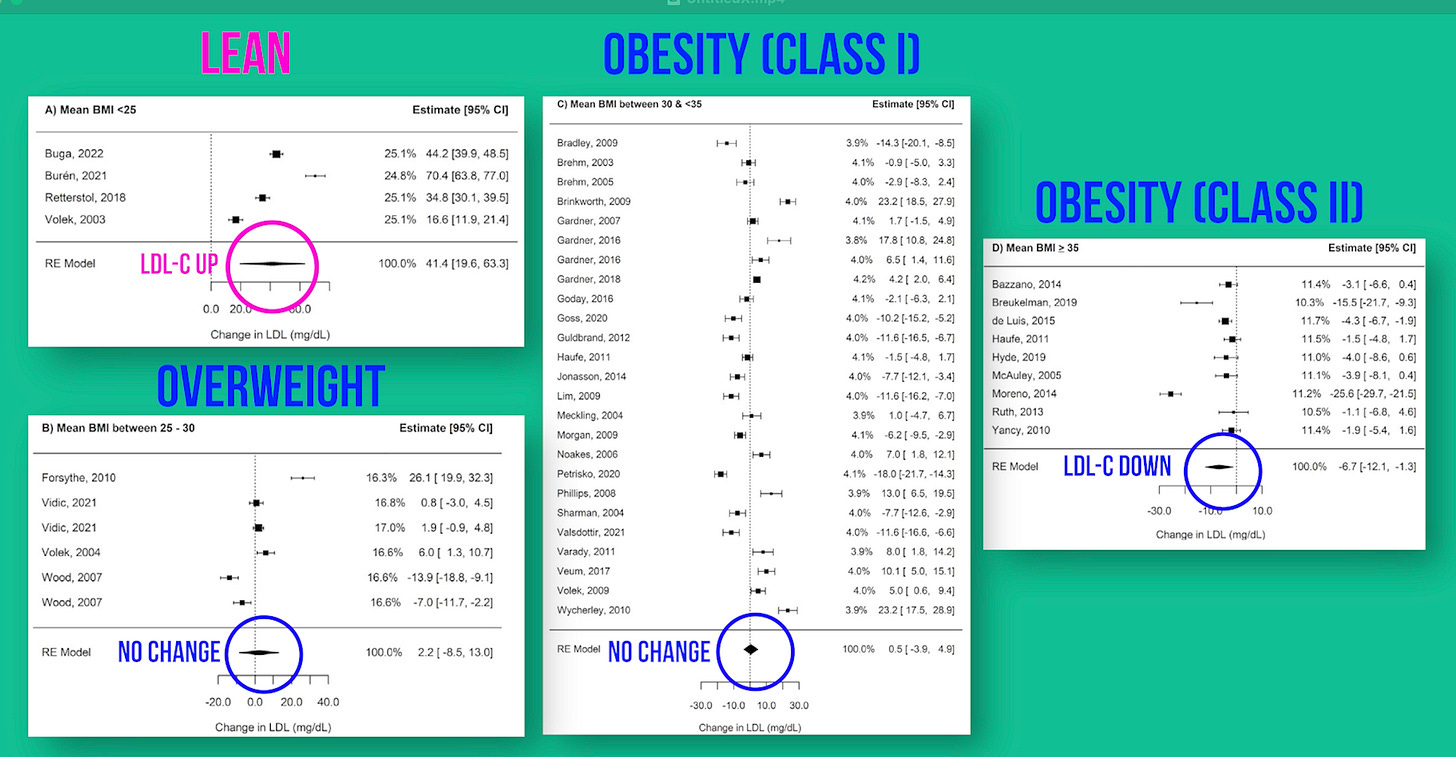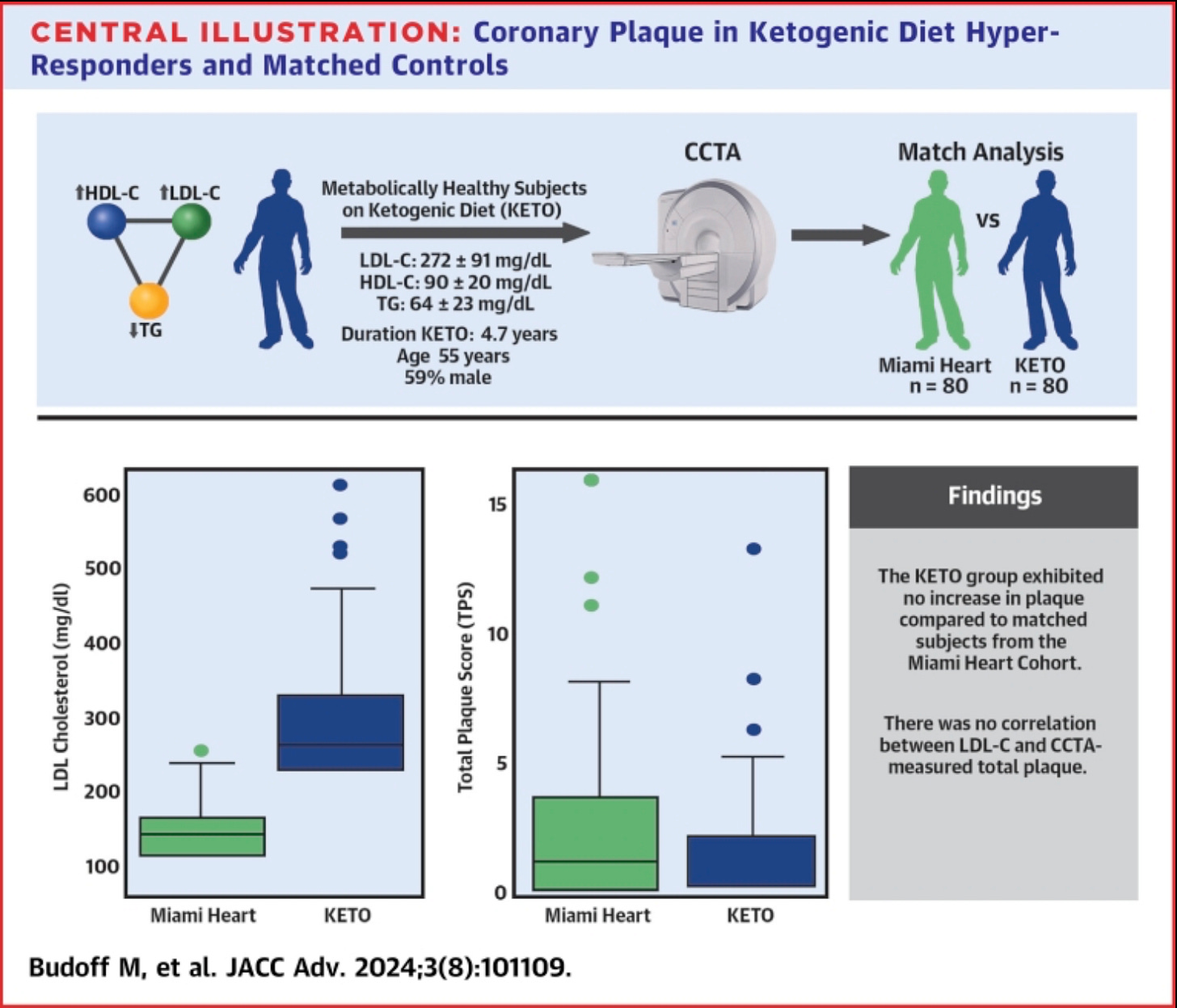Vegan Diet Increased My Cholesterol!
In my latest N = 1 experiment, I went from an Animal-Based Keto Diet to a Vegan-Keto Diet and my LDL increased
In my latest N = 1 experiment, I went from an Animal-Based Keto Diet to a Vegan-Keto Diet and my LDL increased by 14%.
My ask from you, straight up, is that you watch and share the video. But for those who prefer to read, here’s a quick breakdown:
I started on an animal-based ketogenic diet, with macros as shown below (left). Then, I switched to a vegan keto diet, , with macros as shown below (right).
As you can see, saturated fat intake dropped tremendously, over 4-fold. And my cholesterol dropped to zero by definition of a vegan diet.
At the same time, my fiber intake increased from 0 to 21 grams, and my PUFA intake increased by 35%.
Nevertheless, my LDL-C increased by 14%.
How could this be?!
Lipid Energy Model
The explanation is the Lipid Energy Model. In a nutshell (a macadamia nutshell, in this case, which are very hard to crack):
When Lean, Insulin Sensitive People go on Very Low Carb Keto Diets, LDL-C increases as part of a lipid triad of High LDL-C, High HDL-C, and LOW Triglycerides that is the result of shifting from carb burning to fat burning.
The levers that drive how high LDL increases are leanness and activity level.
(And if you want to “nerdy” version, see the figure and caption below.)
The Lipid Energy Model. (A) In the context of carbohydrate restriction, (1) glycogen depletion and changes in circulating hormones stimulate (2) hormone-sensitive lipase (HSL)-mediated secretion of (3) non-esterified fatty acids (NEFA) by adipocytes to fuel oxidative tissues. The liver captures circulating NEFAs and (4) repackages them into triglycerides (TG) shipped out from the liver aboard VLDL. (5) Increased lipoprotein-lipase (LPL)-mediated VLDL turnover generates increased LDL-C and HDL-C. LDL-C and HDL-C. (B) The magnitude of carbohydrate restriction, adiposity (leanness), and energy expenditure each contribute, as independent variables, to the magnitude of change of the triad components.
Thus, when I went to my vegan keto diet…
…despite the drop in saturated fat and cholesterol and increase in fiber and PUFA, the restrictive (here meaning: large, acute calorie drop) nature of the vegan keto diet vs the carnivore-ish keto diet drove UP my LDL.
The importance of these factors, especially leanness in determining LDL-C on low-carb diets, is documented in the literature, including our meta-analysis of 41 human RCTs.
Forest plots from meta-analyses of RCTs on low-carb diet trials showing that studies conducted in lean persons (BMI < 25 kg/m2) exhibit increases in LDL-C, whereas those conducted in populations with overweight and obesity do not. In fact, in populations of persons with class II obesity, LDL-C tends to decreases. This inverse association between BMI and LDL-C on low carb diets is recapitulated at the individual level, i.e. losing weight and becoming lean can increase LDL-C in the context of carbohydrate restriction.
What are the Consequences on Cardiovascular Risk?
Well, truth be told, nobody knows for sure.
The factors underlying a change in any given biomarker, and the metabolic context surrounding that biomarker do inform risk.
And, at the presence time, the only data we have on cardiovascular risk in lean mass hyper-responders, as published in the Journal of the American College of Cardiology: Advances.
We need more research. And I feel fortunate to be part of such a stellar team pursuing this research, including with respect to mechanism and clinical implications.
My Challenge to You
In closing, I present to you this challenge: Be Curious!
Concepts like “Keto” “Carnivore” “Vegan” “LDL” and “Cholesterol” provoke emotion.
Why do you think I did this experiment? I’m not hiding my motives in the slightest.
From Oreo Vs Statin to 720 Eggs to Vegan Keto and beyond, one practical function of N = 1 Science is to provoke discussion. And it has worked, brilliantly to advance dialogue and facilitate resource acquisition to do the studies we really want to do!
There’s much more coming – include a Keto Vegan replication by my friend, Dave Feldman!
So, if N = 1 wasn’t enough for you, prepare for N = 2.
And, of course, see the full video. Comment. Engage. Share.
SiPhox
There’s growing enthusiasm for N = 1 Science. I LOVE IT!
To enable your N = 1 science journey, I want to help put your data in your hands! This is why I partnered with SiPhox, who provide affordable and convenient at-home mail-in blood testing kits.
They’re going to be my go-to in future N = 1 experiments. And if you want to sign up for their services (Click: HERE) and get their kits, you can use Discount Code: NICK15
Baring my Soul
Finally, if you want insight into why I’m so passionate about N = 1 Science and N = 1 Healthcare, I wrote this opinion article (Click: HERE) where I share stories and reflect on the Power of N = 1!











Hi Nick! I've been following your work on LMHR with interest. I'm glad you and the others are studying this further, because I think I'm a classic LMHR, but I'm not happy w my ApoB nor my NMR lipoprofile. It's encouraging that the first round of CCTAs in your study showed no correlation between high LDL and plaque formation, and I assume the 1 yr follow-up CCTAs are in the works. Do you have any plans to study any of the other biomarkers for ASCVD risk, like ApoB, small particle LDL, etc?
p.s. I'd be happy to contribute to your data set. Prefer not to post my actual numbers here, but happy to share privately if it would be helpful to you and your research partners.
oh oh oh! great N = 1 provoking experiment! I am thinking about you looking at the plate :))))))
there was a huge calorie deficit and I suppose you continue exercise :))) this is the lipid energy model in practice! hope you are well !!!!!!! curious about Dave! and my N = 1 adding more calories in my diet